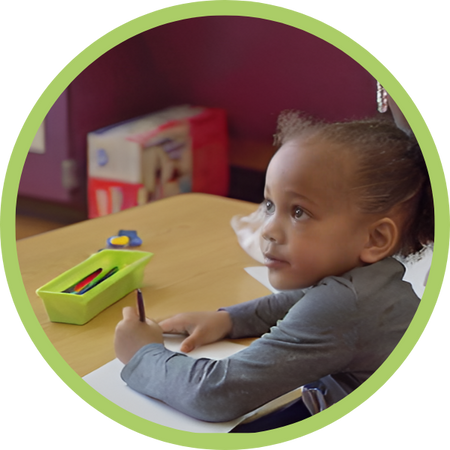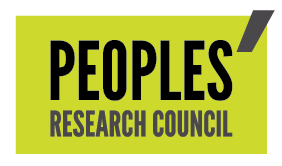
Advocating for Pre-K that meets the needs of every child in Forsyth County.

Current Pre-K Parent Quality Standards Opportunities...
Across our country, and right here in our own community, Black and Brown children often begin their education journeys in Pre-K classrooms, staffed with predominantly white educators. They leave their affirming home environments, and enter an educational environment that is not reflective of their culture and community.
Black and Brown children are not only tasked with the same learning objectives as their white peers, but they are also tasked with learning to adapt to cultural differences and practices that they do not understand, and to which they have never been exposed.
Despite diversification efforts, 79% of public school educators remain white (Schaeffer 2021), and even the most well-intentioned white teachers are not equipped with the understanding and perspectives of Black and Brown children, their families, and their culture.
Our vision is to make a positive impact on how Black and Brown children begin their educational journeys by shedding light on these issues and sparking transformative change to give all children a strong foundation to begin their learning journey.
Where We Started
A persistent issue in the early childhood education space has been the exclusion of Black and Brown parents, families, and children from research that informs decision-making processes.
In 2021, Forsyth Family Power kicked off a project to amplify the voices of Black and Brown parents to shape a more equitable Pre-K system for Forsyth County. Four Black parents, trained in Community-Based Participatory Research (CBPR), spearheaded an effort to gather and analyze data from Black and Latino families. This work led to a report and a set of recommendations directly from Black and Brown parents about the high-quality standards they would like to see for Pre-K locally.
MEET THE PARENT RESEARCHERS

Sharlee Hainesworth,
Lead parent researcher

Nicole Howard

Dr. Ricky Johnson

Tiara Morris
Inspired by Village of Wisdom’s (VOW) advocacy for culturally-affirming learning environments, FFP engaged directly with the community to verify this shared value. In this spirit, FFP empowered Black and Brown parents to gather pivotal insights and champion a research-driven approach to amplify the voices and experiences of their communities in creating nurturing and supportive educational spaces.
Parent Recommendations for Pre-K
1
Require early childhood educators to know and understand every child’s interests to help each child stay engaged while they are learning.
3
Develop curriculums and create learning environments where Black and Brown children are affirmed and can see themselves represented positively.
5
Develop a deep understanding of what it takes to build trusting relationships with children and to understand what is needed for that child to excel.
7
Eliminate barriers that prevent any 4-year-old in Forsyth County from gaining access to Pre-K services.
2
Create a culture within their program that motivates Black and Brown Pre-K children and instills confidence in their ability to learn.
4
Require educators to complete a multicultural education training to close the gap between communities and cultures embraced by Pre-K children and Pre-K providers.
6
Incorporate lessons about social justice so that children can begin to develop an understanding of the world in which they live.
8
Create an educational and organizational culture and environment that produces caring educators who are passionate about their work with Pre-K children.
These parent quality standard recommendations influenced the next research phase: deliberative dialogue sessions designed to engage Pre-K providers, directors, and teachers to focus on what it would take to transform the recommendations into action. A second, follow-up report is planned to share the findings of these activities.
The intentional approach to this project demonstrates a commitment to prioritize the experiences of Black and Brown families and foster greater educational equity in Forsyth County. Our vision is to begin to implement these recommendations through the ARPA Pre-K Pilot and the Pre-K Priority.
Building Our Momentum
THROUGH RESEARCH
Following the initial research carried out by parent researchers, Forsyth Family Power has partnered with Forsyth Futures, a local data and research nonprofit to bring providers & teachers into deliberate dialogue with parents, aimed at building clarity on how the recommendations should be implemented.
A second, follow-up report is planned to share the findings of these deliberative dialogue sessions and provide additional details about how the recommendations might be successfully implemented in the local Pre-K ecosystem.
THROUGH ACTION
The Peoples’ Research Council (PRC) is entering an early pilot phase in 2024, beginning with four pilot projects. One of these pilots is focused on positioning the voices of Black and Brown parents to drive the action strategies that come out of this body of research.
Additionally, the PRC is working to coordinate and align with the activities of the Pre-K Priority. The Pre-K Priority is a coalition of community organizations and individuals committed to improving the number of affordable, high-quality Pre-K programs available to all four-year-olds in Forsyth County. Our goal is for these collective activities across both the PRC and the Pre-K Priority to be mutually supportive of implementing the parent quality standards through ARPA Pre-K Pilot Classrooms as well as through the Pre-K Priority’s efforts more broadly.
The PRC’s interaction with the Pre-K Parent Quality Standards are currently framed as:
1
Research Gaps & Barriers on how to best implement parent recommendations (ex. integrating lessons about social justice into Pre-K classrooms)
3
Accountability – safeguard the recommendations, hold people and institutions accountable to staying true to parents’ recommendations, and direct transparency and reporting to broader community.
2
Engagement – act as a mechanism to bring people and institutions together, promoting engagement through this research/action, and supporting the community narrative of this work.
4
Report Publication & Dissemination – support report publication and dissemination. Collaborate with PRC communications capacity to get the report into the hands of people who need to read it!
What Can I Do?
-
- Sign up for the Peoples’ Research Council mailing list.
- Send us an email ([email protected])
- Learn more about Village of Wisdom and the Black Genius Framework
- Learn more about the Pre-K Priority and sign up for their mailing list.
